
Examining COVID-19 Vaccine Hesitancy in Nigeria, Kenya, and South Africa: A Cross-National Study
July 2024
To further understand the motivations for hesitancy toward the COVID-19 vaccine, the authors of this paper administered a demographically representative survey and conducted one-on-one interviews in Kenya, Nigeria, and South Africa. This study provides a deeper understanding of vaccine hesitancy in the three countries and represents one of the first mixed methods, cross-national studies of COVID-19 vaccine hesitancy in Africa that we are aware of. Understanding the drivers of vaccine hesitancy in these three countries provides an opportunity to create more effective communication strategies and public health policies that can increase vaccine uptake locally. Doing so can reduce the disease burden for each country and contribute to strengthened global health security.
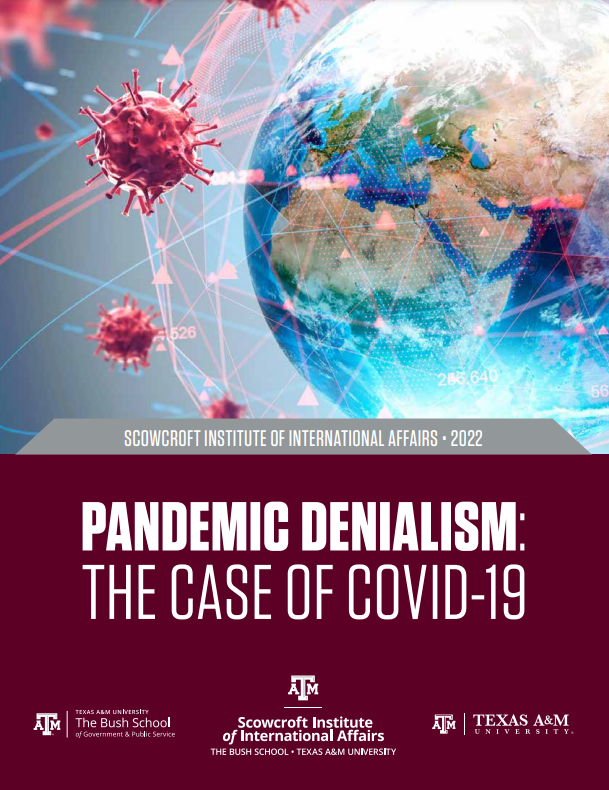
Pandemic Denialism: The Case of COVID-19
October 2022
The COVID-19 pandemic, a globally impactful historical event, has led to denialism fueled by political, economic, and ideological motives. This denialism takes various forms, from downplaying the virus to spreading misinformation. Beyond immediate mortality, millions suffer long-term health consequences, contributing to the pandemic’s multifaceted impact. Economic ramifications include business closures, unemployment, and inflation. Additionally, the pandemic has increased public debt and disrupted global supply chains. Conspiracy theories and vaccine hesitancy thrive due to misinformation on social media. Addressing this requires robust safeguards and mechanisms to uphold the integrity of information dissemination in the face of denialism and political challenges.
View the “Pandemic Denialism: The Case of COVID-19” White Paper here.
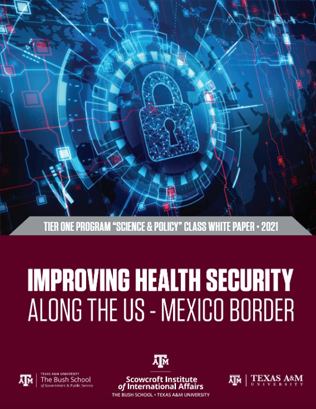
Improving Health Security Along the US-Mexico Border
May 2021
The US-Mexico border is a 2,000 mile stretch with significant cultural, political, and economic importance to the United States. Since the earliest days of American expansion into the Mexican state of Tejas, the region has offered both challenges and opportunities. While the earliest battles in the border region centered on land
ownership, economic development, and defining the physical border itself, the medicalization of the border
beginning in the early 1900s, has shaped American ideas of national security and public health over the course
of the last century.
View “Improving Health Security Along the US-Mexico Border” White Paper here.
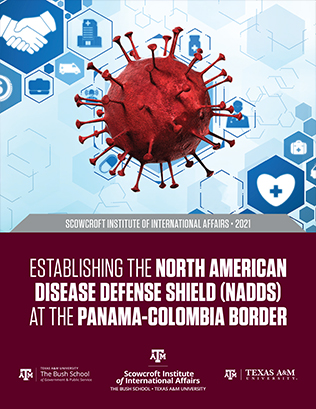
Establishing the North American Disease Defense Shield (NADDS) at the Panama-Colombia Border
October 2021
The COVID-19 pandemic has demonstrated the devastating impact infectious diseases can have on human health, social orders, economies, and political systems. Throughout human history, pandemics have remade governments and economies. The extensive reach of infectious disease, combined with global vulnerability to rapidly spread due to globalization, makes it vital that the U.S. learns lessons from COVID-19 and previous pandemics in order to reduce the damage that can be caused by future outbreaks.
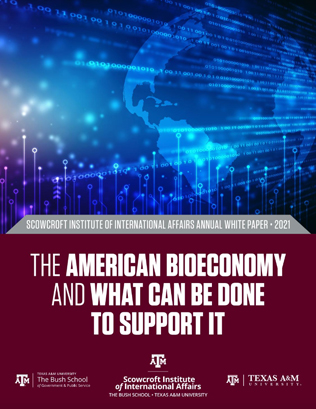
The American Bioeconomy and What Can Be Done to Support It
August 2021
For the past five years the Scowcroft Institute for International Affairs at the Bush School of Government and Public Service has been hosting an Annual Pandemic Policy Summit. The goal of these summits is to address the most pressing issues facing scientists, policymakers, and the overall pandemic preparedness and response enterprise. This year, the summit was held virtually in the midst of the COVID-19 pandemic and while the pandemic was discussed at length, we set a goal to look beyond the current crisis and address the next pandemic coming down the road.
View “The American Bioeconomy and What Can Be Done to Support It” White Paper here.
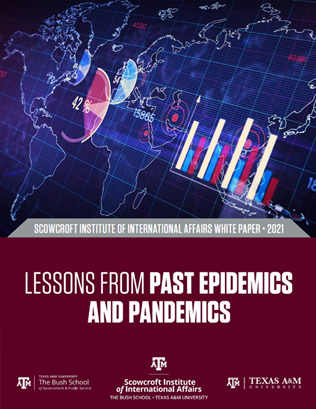
Lessons from Past Epidemics and Pandemics
July 2021
The COVID-19 pandemic was the first major, truly global pandemic since the Great Influenza pandemic of 1918 and, as such, drew numerous comparisons to the infamous pandemic a century ago. These comparisons also prompted people to speculate whether we had learned anything about pandemic response since 1918. The short answer to this is “yes.” We have made tremendous scientific advancements and improved communication and technology.
View “Lessons from Past Epidemics and Pandemics” White Paper here.
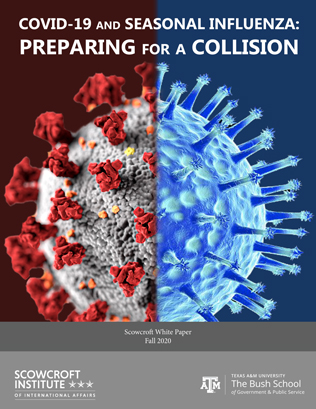
COVID-19 and Seasonal Influenza: Preparing for a Collision
August 2020
On December 31, 2019 China reported a cluster of pneumonia-like cases to the WHO Country Office. Though December 1, 2019 marks the earliest known date of COVID-19 symptom emergence, research by scientists at Harvard argues that the virus could have been circulating as early as August (Nsoesie et al., 2020). By early January, the confirmed cases of the disease appeared in countries around the world.
View “COVID-19 and Seasonal Influenza: Preparing for a Collision” White Paper here.

Pandemic Preparedness and Response in the Age of Technology
June 2020
Effective pandemic preparedness and response depend on the quality as well as the speed of obtaining relevant information, especially from remote and hard to reach areas of the world, where most known and unknown disease outbreaks occur and originate. Equally important is the local/national ability to collate, analyze, and interpret the information in a form valuable for taking appropriate preventive action and response.
View “Pandemic Preparedness and Response in the Age of Technology” White Paper here.
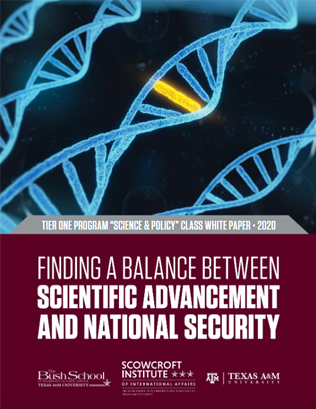
Finding a Balance Between Scientific Advancement and National Security
June 2020
Emerging technologies for gene editing have facilitated rapid advances in medicine, agriculture, industrial and biopharmaceutical manufacturing, and environmental sciences. However, the misuse or negligent use of these technologies poses significant national security risks, including the accidental or intentional pandemic emergence of engineered pathogens.
View “Finding a Balance Between Scientific Advancement and National Security” White Paper here.

Incentivizing Novel Approaches to Combat Antimicrobial Resistance
August 2019
As part of the Tier One Program, a “Science & Policy” interdisciplinary class on pandemics took place at the Bush School of Government and Public Service at Texas A&M University. The class was comprised of graduate students from five different departments across campus. The students produced this White Paper as part of their research on combating antimicrobial resistance. Antimicrobial Resistance (AMR) is the process by which microorganisms, such as viruses and bacteria, develop capabilities that render antimicrobial medicines ineffective in treating infections.
View “Incentivizing Novel Approaches to Combat Antimicrobial Resistance ” White Paper here.

Community Resilience, Centralized Leadership & Multi-Sectoral Collaboration in Pandemic Preparedness
May 2019
Since the end of the 1918 pandemic the world has faced three more influenza pandemics, the most recent being the 2009 H1N1 pandemic which infected 2 billion people in 6 months. Additionally, we face an ever increasing frequency of emerging infectious diseases with pandemic potential. These diseases could kill millions, cost billions, and have other significant economic, social, national security, and political consequences. If the United States and international system do not make progress towards closing the gaps addressed in this and previous Scowcroft white papers, countries will remain vulnerable to a devastating outbreak.

Pandemic Preparedness: An Interdisciplinary Approach to Disease Prevention & Control
May 2019
On Oct. 14, 2018, the Scowcroft Institute of International Affairs conducted a pandemic simulation designed to give students from across Texas A&M University a high-impact, interdisciplinary learning experience. All authors of the paper are student participants of an exercise where they responded to a simulated H7N9 outbreak, and this is a report of their findings.

Global Leadership at a Crossroads: Are We Prepared for the Next Pandemic?
May 2018
In this report, the Scowcroft Institute of International Affairs at The Bush School of Government and Public Service at Texas A&M University outlines eight priority areas and their accompanying recommended action items to address vulnerabilities in the current pandemic preparedness and response system.
View “Global Leadership at a Crossroads: Are We Prepared for the Next Pandemic?” White Paper here.

The Growing Threat of Pandemics: Enhancing Domestic and International Biosecurity
March 2017
The threat posed by pandemics grows alongside increased globalization and technological innovation. Distant cultures can now be connected in a day’s time, and international trade links global health and economic prosperity. In this report, the Scowcroft Institute of International Affairs at The Bush School of Government and Public Service at Texas A&M University details nine priority areas and accompanying action items that will help to address current pandemic response problems.

